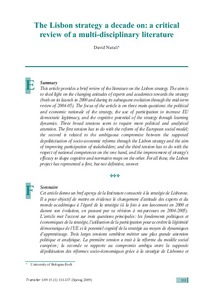The Lisbon strategy a decade on : a critical review of a multi-disciplinary literature

Transfer. European Review of Labour and Research
2009
15
1
Spring
111-137
European social model ; governance ; sociological aspect ; Lisbon strategy
European Union
English
Bibliogr.
"This article provides a brief review of the literature on the Lisbon strategy. The aim is to shed light on the changing attitudes of experts and academics towards the strategy (both on its launch in 2000 and during its subsequent evolution through the mid-term review of 2004-05). The focus of the article is on three main questions: the political and economic rationale of the strategy, the use of participation to increase EU democratic legitimacy, and the cognitive potential of the strategy through learning dynamics. Three broad tensions seem to require more political and analytical attention. The first tension has to do with the reform of the European social model; the second is related to the ambiguous compromise between the supposed depoliticisation of socio-economic reforms through the Lisbon strategy and the aim of improving participation of stakeholders; and the third tension has to do with the respect of national competences on the one hand, and the improvement of strategy's efficacy to shape cognitive and normative maps on the other. For all these, the Lisbon project has represented a first, but not definitive, answer."
Digital;Paper
The ETUI is co-funded by the European Union. Views and opinions expressed are however those of the author(s) only and do not necessarily reflect those of the European Union or the ETUI.